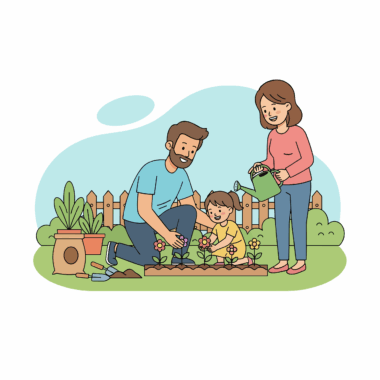How Urban Gardening Can Help Reduce Pollution and Improve Personal Fitness
Urban gardening plays a crucial role in enhancing environmental fitness while also addressing pollution concerns. By incorporating green spaces into cities, residents can actively contribute to improved air quality. Plants naturally filter pollutants, absorbing harmful gases and releasing oxygen. Urban gardens also mitigate urban heat effects, which can help lower temperatures in densely built environments. Moreover, community gardens encourage social interaction among residents, promoting a sense of belonging and empowerment. As people work together to cultivate greenery, they engage in physical activity, helping improve overall fitness. Many studies show that gardening can enhance mental health as well. Engaging with the soil, planting seeds, and nurturing plants offer therapeutic benefits that promote well-being. In cities where greenery is sparse, urban gardening transforms neglected lots into vibrant gardens, driving ecological rejuvenation. Beyond aesthetics, these gardens serve as living laboratories for sustainability. They illustrate ways to lead eco-friendly lives. Urban gardening also empowers individuals to grow their own food, reducing reliance on commercial produce, which often has a significant carbon footprint. Thus, urban gardening emerges as a holistic solution to pollution and personal fitness challenges, fostering healthier communities.
Urban gardening fosters biodiversity, contributing to healthier ecosystems in cities. By cultivating various plant species, urban gardeners can attract pollinators such as bees and butterflies. This biodiversity is crucial for the stability of the environment. Healthy ecosystems are fundamental to maintaining the balance of urban habitats. Moreover, urban gardens can serve as essential resources for wildlife, offering food and shelter. As these gardens flourish, they also act as ecological checkpoints, purifying the water that runs through urban areas. Rainwater can be captured and filtered through the garden, reducing runoff pollution. Additionally, local food production significantly decreases greenhouse gas emissions associated with food transport. When communities grow their own produce, they broaden their awareness of seasonal eating, promoting sustainable habits. Furthermore, community gardens foster teaching experiences. Gardening skills and knowledge can be shared across generations, linking younger and older community members. This intergenerational exchange cultivates respect for the environment. It stresses the importance of sustainability. In cities struggling with food deserts, urban gardening creates opportunities for healthy eating. Urban dwellers can access fresh produce that might be otherwise unavailable, improving nutrition overall.
Health Benefits of Urban Gardening
Engaging in urban gardening offers numerous health benefits that extend beyond physical fitness alone. Gardening encourages individuals to be more active, engaging in various physical activities like digging, planting, and weeding. These activities contribute to increased aerobic exercise levels, helping individuals maintain a healthy weight and reduce the risk of chronic diseases. Studies indicate that regular physical activity is associated with improved cardiovascular health, stronger muscles, and better balance and coordination. Beyond the physical benefits, urban gardening also provides significant psychological advantages. Gardening is often associated with reduced stress and anxiety levels, promoting mental clarity and focus. The act of nurturing plants can provide individuals with a sense of purpose and accomplishment, enhancing emotional well-being. Furthermore, spending time outdoors in nature can improve mood. Natural surroundings have been shown to lower cortisol levels, the hormone associated with stress. Urban gardening allows people a chance to connect with nature, which can be particularly beneficial in concrete-heavy environments. Engaging with the earth promotes mindfulness, bridging gaps between physical activity and mental health, making gardening an ideal pursuit for urban dwellers seeking holistic improvement.
Urban gardening can also play a significant role in combating climate change. With cities being major contributors to greenhouse gas emissions, urban gardeners are positioned to lead the charge for environmental change. By creating green spaces, urban gardens mitigate the excessive heat prevalent in cities, a phenomenon known as the urban heat island effect. Moreover, plants absorb carbon dioxide from the atmosphere, contributing to lower levels of this greenhouse gas. Urban gardening not only combats pollution but also promotes responsible waste management, particularly through composting. By converting kitchen scraps into nutrient-rich compost, individuals can reduce landfill contributions. This practice also enriches the soil in urban gardens. Additionally, implementing rainwater collection strategies can help reduce water runoff that often carries pollutants into local waterways. Urban gardening promotes sustainable practices that can lead to greater eco-awareness within communities. As neighbors collaborate on gardening projects, they can share resources and tips that extend beyond food production. This networking fosters a collective commitment to sustainability. Overall, urban gardening represents a proactive approach to climate change, ensuring that communities can adapt and thrive in a challenging environmental landscape.
Building Community Through Urban Gardening
The community-building aspect of urban gardening cannot be overstated. Community gardens serve as gathering spots for individuals with common interests and goals, fostering friendships and cooperation among diverse demographics. They break down barriers, promoting cultural exchange and understanding. In an era marked by social isolation, these communal spaces become vital for connecting people. Urban gardening initiatives can bridge differences between generations. Older adults can share their gardening wisdom and skills, while younger individuals contribute fresh ideas and energy. This intergenerational partnership can lead to innovative gardening practices. Furthermore, community gardens empower individuals to influence local environmental health. By collectively advocating for sustainability, residents can push for city policies that elevate green space in urban planning. Local governments benefit from the social cohesion that robust community gardens foster. They spur interest in environmental concerns, leading to more initiatives aimed at preserving urban green areas. Volunteers who participate in maintaining these gardens often develop a sense of stewardship towards their environment. The strong connections forged through gardening can translate to enhanced civic engagement, encouraging residents to participate in local governance and decision-making processes.
Urban gardening also encourages the discovery of sustainable agricultural practices that can be adopted at home. With greater accessibility to knowledge and resources, residents learn about organic gardening techniques, pest management, and soil enrichment. These practices contribute to healthier food systems. Urban gardens can produce fresh vegetables, fruits, and herbs, enabling communities to strive for greater food sovereignty. Embracing local food sources not only increases nutrition but reduces dependence on industrial food systems. This autonomy can be empowering, particularly for marginalized communities that face food insecurity. Workshops and community events related to urban gardening can facilitate the dissemination of knowledge to aspiring urban gardeners. People can learn from local experts and experiment together, fostering a culture of collaboration. The recipes developed using locally grown produce can promote culinary creativity within the community. Further, cooking sessions sponsored by community gardens can enhance the excitement around healthy eating. Sharing produce through food banks and local shares encourages a spirit of generosity and interconnectedness. Therefore, urban gardening serves as a gateway to a healthier, more sustainable food culture in urban environments.
Conclusion: The Future of Urban Gardening
As urban gardening continues to evolve, it holds immense potential for transforming cities and improving personal fitness. It provides solutions to critical aspects of daily life, including pollution reduction and nutritional health. Urban gardens serve as a connection point for communities that cherishes green space. These thriving ecosystems create partnerships that bridge cultural barriers and illuminate shared values around health, nature, and sustainability. As cities around the globe face increasing pressures from growth and pollution, urban gardening can play a pivotal role in creating greener cities. For urban gardening to thrive, dedicated support from local governments, organizations, and community members is essential. Initiatives like community grants or educational programs can increase participation and resource availability. Funding can support urban gardening projects that alleviate food insecurity while promoting environmental awareness. Furthermore, innovative designs, like vertical gardening solutions, can maximize space and yield. By advocating for policies that support urban gardens, individuals can inspire others to join the movement. Ultimately, urban gardening offers opportunities to improve not only individual health and fitness but also encourages a shared commitment to protecting the environment. Embracing fixtures of urban gardening will foster lasting health benefits.





